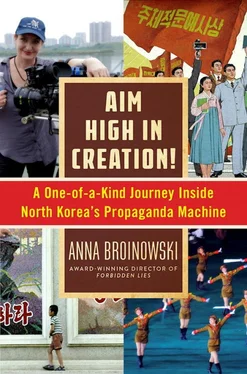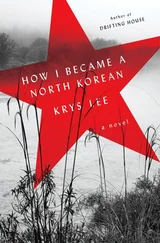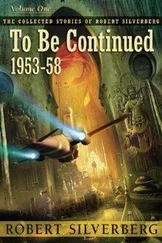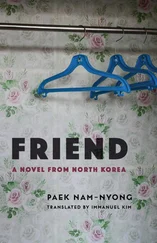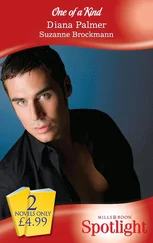“She wants to move here. What should she do?” Sun Hi translates, not amused. Pak looks at me coolly. “She can go to Brazil,” he says. And walks away. He knows I will follow him, this courtly man in his neatly pressed chinos who has taken me under his wing like a tae kwon do master might take on a promising but particularly irritating student: tolerating my banter, correcting my errors, and attending to my education with genuine solicitude. I leave Q and Sun Hi to help Nic shoot golden hour and join Pak in the shadowy glade behind the Arizona music shop. Below us is a thickly wooded forest, and beyond it a broad meadow flanked by the churches and chalets of Kim Jong Il’s Europe. In the distance, the goatherd leads his flock towards a gothic abbey, its stained-glass casements glowing in the twilight. There’s a sudden flash of colour as a window below the belfry swings shut—and I’m sure I see a figure behind it, ducking into the shadows. Perhaps the Pyongyang Film Studio doubles as a shelter at night.
“It’s hard to find thick forests like this,” muses Pak, ignoring what just happened. “When I stay back late for work in the evening, I find the air here so fresh. It’s different from the air in the city.” I stand beside my North Korean mentor, breathing in the beautiful air. Pak has earned my respect, and not just because he wants my film to succeed. He doesn’t miss a trick. Back at the studio, I asked him to hold a picture frame for a portrait, something I’ve done with all the filmmakers. The frame contains green cardboard so that we can superimpose images from North Korean movies in the edit. “Please stay still and stare down the barrel for fifteen seconds,” I asked Pak, and he shot me a crafty look: “Are you using me to advertise products?” I promised I wasn’t, and he held the picture with indulgent gravitas as Nic zoomed in and out of the frame: “God, I feel like a dead man being photographed,” he said, with a martyrish groan.
Now, in the gloaming, the woods spread beneath us are full of mystery. The deepening affection I’m feeling for Pak is just as mysterious—both resonant and delicate. I am yearning to know how he became North Korea’s favourite director, what his relationship with Kim Jong Il was like, what happened to his filmmaking friends who failed, or stopped working, or just disappeared. But Pak is not free to answer me, and I cannot question him at will. If he could answer, I suspect his stories would be horrific. Pak’s serenity indicates that he, at least, has not destroyed others to get where he is. He has the air of someone who sleeps well at night.
Gazing at Pak’s cherished forest, I’m reminded of places where I’ve spent some of the happiest times of my life: camping with my ex and our beautiful new baby, playing guitar with friends around languid summer bonfires, walking with our growing daughter through Australia’s ancient bush. I slip into Japanese and the one thing we can discuss without retribution: “Sensei, are you married?” I ask.
He gives a tired smile. “I’ve been married so long, I’ve forgotten our wedding day.”
“Do you find it hard, making films and maintaining a relationship with your wife?”
“No one wants to be married to a filmmaker,” he sighs. “You betray them every time you walk onto set.” I nod. Being in Pak’s presence has the uniquely soothing effect I’ve encountered twice before—with the enlightened monk in South Korea, and with the queer artist Quentin Crisp. It’s an existential kind of compassion: a kindness that makes you reflect on your problems with love, instead of anger. I’ve been diabolical to love, I reflect calmly. The intense creativity of filmmaking draws on the same part of the heart. Some think that a pram in the corridor is the death of the artist, and my life has been a constant struggle to prove this wrong.
“You’re having a hard time, aren’t you,” Pak observes. And without him having to say any more, I know that my ex’s young woman is not the cause of our breakup, but the symptom. I’ve always loved my daughter and my films—but I’ve only rarely been able to give her father the same attention and care. Pak gently pats my shoulder, and I feel infused with lightness. I will forgive my ex, I realise. I will acknowledge my own role in his pain, and move on. And one day, when we’ve healed enough to become friends, I will give him some David Beckham cologne—as payback.
The sun sinks to the tree line, a bloody, molten ball. “Here,” says Pak, springing into action as Nic walks over to line up a shot. “If you do this, it looks more realistic.” He pulls down a sprig from an overhanging bush, holding the leaves dead still in front of Nic’s lens until the sun disappears.
MY FANTASY OF DEFECTING TO NORTH Korea to make movies is dead. There’s too much you can’t do. The censorship began this morning: the Yangakkdo cleaning ladies drew a thick black cross through the note I left them, explaining the brown streaks on my washcloth were nothing more unpleasant than makeup. And now, Sun Hi won’t let us shoot anything not explicitly on the itinerary. This includes the big cinema screen outside Pyongyang train station, the portrait painters in front of the Grand People’s Study House, the black-market stall selling Chinese sweets and dried fish on Moran Hill, and a Coke can mysteriously left in a bin on Sungri Street. Sun Hi will neither acknowledge this proof that foreigners are not the only ones drinking Coke in Pyongyang, nor explain where it came from. And it’s all thanks to Q.
When we began the day at the Leaders’ statues at Mangyongdae, Team Gas was happy. Sun Hi was her cheeky self, parroting everything Nic and I said and wearing her koala cap at a jaunty angle. As thousands of soldiers and schoolchildren streamed up the steps to lay flowers at the Kims’ huge bronze feet, Sun Hi chewed bubblegum and spoke off the cuff, working the camera like a pro: “Here we stand at the statues of the Great Leaders Kim Il Sung and Generalissimo Kim Jong Il. Our People are always longing for them. This is the day of the DPRK’s foundation, a national holiday. People are coming from all parts of the country to greet them. We call Great Comrade Kim Jong Il ‘Our Father,’ because thanks to his policies, we defended our system of socialism. When he passed away, it was the bitterest agony for our People, and everyone felt heartbreak.”
I stared at the rows of bowing people, their eyes fixed on Kim Jong Il’s bronze head with the same intensity as the mourners who fell before his hearse, and asked Sun Hi the question that had plagued the blogosphere for months: “Were the tears your people cried the day he died genuine?”
Sun Hi’s eyes widened in genuine surprise: “Of course! True grief comes from the heart! You can’t make sadness!”
“Why did you love him so much?” I prompted, and Sun Hi, with the insolence of a teenager explaining wi-fi to a baby boomer, said: “It’s hard for you guys to understand, because only in our country is there such love for the Leaders. But from when we are born, we get such care from our Party. We have a women’s hospital where they don’t pay for child. After birth, they are given modern medicines, like tonics and honey for their health. As I grew up, I learnt piano. Then I went to school and studied journalism at uni, all for free. In other countries, this can’t happen. For example, I’m just an ordinary girl, who has bad teeth. When I go to the dentist, the government pays for it, and when I have bronchitis, I don’t pay for the X-rays. Everything is in the People’s interest. There are many countries which suffer wars, and the children suffer malnutritions, and the state doesn’t care. But we have a good life here, and that’s all thanks to the good policy of our General. That’s why everyone loves our Great Leader.”
Читать дальше
